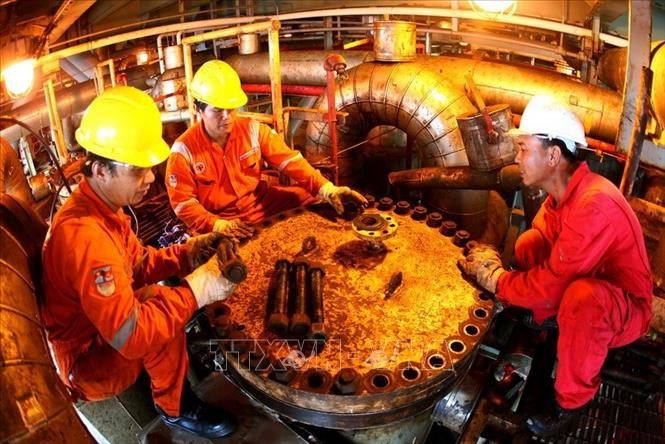(VOVWORLD) -Today marks the 138th anniversary of International Labor Day (May 1). In Vietnam, the working class currently comprises 14% of the population and is the leading force in national industrialization and modernization. The 13th National Party Congress set a goal of improving workers’ political willpower, educational qualifications, and occupational skills, and building a more modern and stronger Vietnamese working class.
 Workers maintain drilling equipment on the Bach Ho oil field. Photo:VNA Workers maintain drilling equipment on the Bach Ho oil field. Photo:VNA
|
The Communist Party of Vietnam has clearly defined Vietnam’s vision and aspirations, saying the working class has a great mission and responsibility, and is the core force leading the way to realizing national aspirations.
Building a strong, modern working class
Throughout history, the working class has always been the trailblazer at the center of major national political events. After 40 years of renewal, the Vietnamese working class has grown in both quantity and quality, is present in all industries, occupations, and economic sectors, and leads national industrialization and modernization.
The Vietnamese Party has paid special attention to the development of the working class. The Party issued a separate resolution on building the Vietnamese working class in the new situation. Under the resolution, workers are given opportunities to improve their professional qualifications and occupational skills. Party and State leaders regularly dialogue with workers and adopt policies to ensure workers' housing, employment, and income.
The Communist Party of Vietnam considers the growth of the working class a prerequisite for the success of national renewal, industrialization, and modernization.
Professor Dr. Pham Hong Tung, former Director of the Institute of Vietnamese Studies and Development Science at Vietnam National University, Hanoi, said: “The Vietnamese working class continues to be the pioneering social force that most represents Vietnam’s evolution toward modernization and mastering technology and scientific advances to realize Vietnamese aspiration to become a strong, prosperous nation. That’s the most important social and political premise of the ruling Party.”
Working class’s pioneer role in national development
The working class is the leading force in the Fourth Industrial Revolution, which has transformed every aspect of life. Building a stronger working class during accelerated industrialization and modernization is an urgent task of the Party and State of Vietnam.
According to Associate Professor Dr. Bui Dinh Bon, former Secretary of the Central Theoretical Council, advantages and opportunities lie ahead in the development of the working class. Vietnam's new position and strength help leverage internal and external resources for more vigorous development. Conditions are creating great opportunities for the Vietnamese working class to thrive – a more diverse class structure, favorable participation in international labor cooperation, and a growing number of knowledge and tech-savvy workers.
 Ngo Duy Hieu, Vice Chairman of the Vietnam General Confederation of Labor. Photo: Xuan Quang/Vietnam+ Ngo Duy Hieu, Vice Chairman of the Vietnam General Confederation of Labor. Photo: Xuan Quang/Vietnam+
|
National industrialization and modernization requires the Vietnamese working class to be modern and well-educated. Intellectualizing the working class, especially young workers, goes hand in hand with improving their political willpower, discipline, and industrial style.
Ngo Duy Hieu, Vice Chairman of the Vietnam General Confederation of Labor, said: “Workers continue to be at the center of labor solidarity. Workers, especially knowledge workers, will be the force that achieves national digital transformation and innovation.”
The Vietnamese working class is at the forefront of realizing national aspirations. They are able to seize the opportunities created by the Fourth Industrial Revolution, contribute more to national industrialization and modernization, and be more adaptable to national transformation.